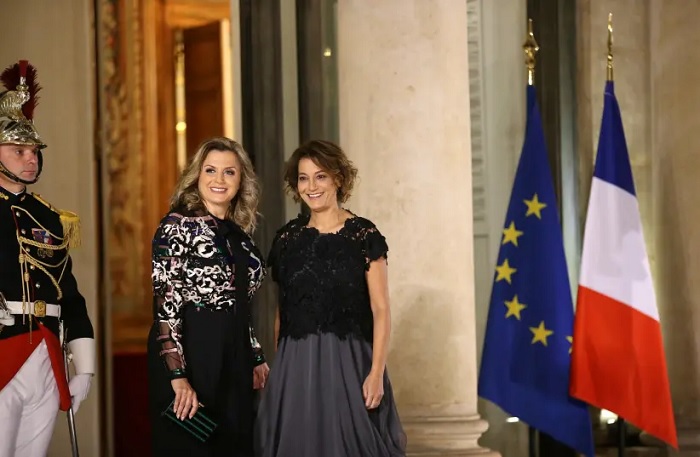
Claudine Aoun Roukoz, daughter of Lebanese President Michel Aoun and head of the National Commission for Lebanese Women, stressed that she would “not mind” if Lebanon makes peace with Israel, in an interview with Al-Jadeed TV on Sunday.
Roukoz stated that border disputes with Israel and Palestinian refugee issues needed to be resolved, stressing that Lebanon is “counting on solving these problems to advance our economy.”
“After these problems are solved, I do not mind that the Lebanese state makes peace with Israel, after the demarcation and the guarantee of resources,” said the Lebanese official to Al-Jadeed. “I defend the interests of my country, Lebanon, first. Are we required to remain in a state of war? I do not have an ideological dispute with anyone, but my dispute is political.”
“I defend the sovereignty and independence of my country, but today we ask who is the victim? They are the Lebanese people,” she said.
Roukoz reiterated part of the comments on her Twitter account.
Her views of the matter seems to be similar to those of her father.
In August, the Lebanese president expressed willingness to consider peace talks with Israel in an interview with the French BFM TV news channel, just days after the United Arab Emirates signed a historic normalization deal with Israel.
In response to a question concerning whether Lebanon would consider making peace with Israel, Aoun stated, “That depends. We have problems with Israel, and we have to resolve them first.” Aoun did not specify what problems would need to be resolved.
In 2006, Aoun signed a formal agreement of alliance between his Free Patriotic Movement and Hezbollah, and has consistently backed the Shi’ite group ever since.
In a statement made concerning neutrality in July, Aoun stated that Lebanon will “not attack anyone,” but is “obliged to defend” itself, according to Lebanon’s National News Agency.
In a television interview in 2005, Aoun pointed to peace deals made between Israel and Jordan and Egypt, stressing that “Lebanon, which has been resisting for 35 years, cannot continue to resist Israel all by itself. It cannot go against the general Arab trend,” according to MEMRI. He added that he was “not calling for peace” and that Lebanon would be the “last to sign a peace agreement with Israel.”
TWO WEEKS ago, Israeli and Lebanese officials conducted US-mediated negotiations about the maritime border between the countries’ Exclusive Economic Zones. The US State Department said that, “during this initial meeting, the representatives held productive talks and reaffirmed their commitment to continue negotiations later this month.”
The talks in Naqoura, which is near the border with Israel, are not about normalization or peace. The officials present were authorized only to discuss the technical matter of the border between the countries’ EEZs.
Neither side is able to develop gas reservoirs in the disputed area, which is a triangle shape starting from the border on the Mediterranean Sea. The dispute is over up to 15 km. in the widest part, and averaging five to six km. The area would be about 2% of Israel’s economic waters.
Sources in the March 8 Alliance led by Hezbollah responded with outrage to the comments, saying that “the pursuit of normalizing relations with Tel Aviv is seen as suspicions of treason,” according to Asharq Al-Awsat, adding that “this environment was present during the Lebanese war and what preceded it, but it did not reach a result, and it will not achieve any result in any circumstance.”
Lebanese MP Ali Khurais, a member of the Development and Liberation bloc, told Asharq Al-Awsat that “our position is clear that Israel is an enemy, and therefore the farthest that the Lebanese can reach is to confirm the 1949 armistice agreement, which is never a treaty, just like the 1996 Understanding and the 2006 Agreement.
“There is neither reconciliation, nor recognition, nor a treaty with the enemy who attacks our land, nor is there any confidence in him under any circumstances,” added Khurais. “Talking about normalization or peace is fabricating problems that are not [relevant] now.”
Wadih El Khazen, president of The Central Maronite Council, a charitable organization of the Eastern Rite Maronite Church, told Asharq Al-Awsat that “the Lebanese structure does not allow us to do more than that, in order to prevent the ignition of the Lebanese sphere.”
El Khazen explained that there were two similar attempts in 1982 and 1983, but they failed after the Lebanese public exploded in response. “Lebanon should be the last Arab country to normalize its relations with Israel because of its peculiarity, composition and the divisions in it.”
 Eurasia Press & News
Eurasia Press & News

